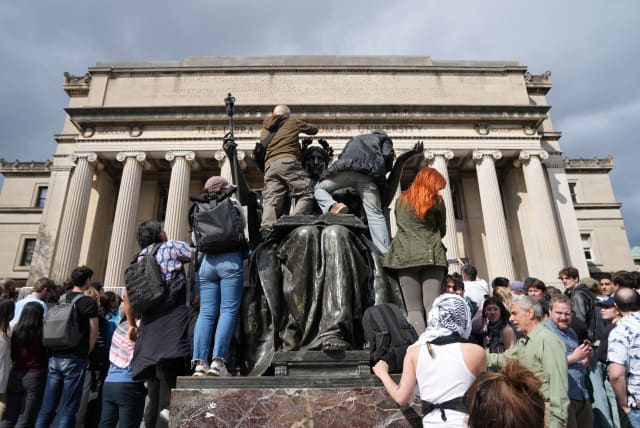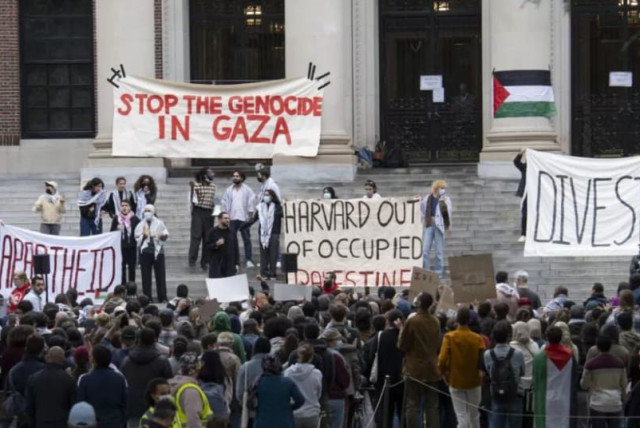It might be time to start our own Jewish Ivy League - editor's notes

Ivy League campuses are now too hostile to Jewish students; we need to take the cue and build new, safe institutions.
If you think we had it bad with antisemitism on college campuses in the US till now—guess what? It’s just going to get worse.
The wave of hostility toward Israel and Jews that swept across elite colleges after the October 7 Hamas attacks isn't a passing storm. It's a full-on hurricane. Jewish families are pulling their kids out of the Ivies faster than you can say, "Free Palestine." They're opting for safety over prestige because who wants their kid to end up in a place where it's safer to be a TikTok troll than a Jewish student?
Take Merav and her daughter, Anna. They had their eyes on the big-name schools, which make you feel like you've made it even if you're just visiting the campus bookstore. But after October 7, when the war with Hamas exploded, they ditched the dream of the Ivy League. "I didn't think I'd have to readjust a college list based on concern for the safety of Jewish students," Merav told CNN. "Our priorities have shifted significantly." Unfortunately, Merav, you're not alone.
It will only get worse; we need to take a stand now
Then there's my friend, journalist, and author Liel Leibowitz. This guy, an Israeli who immigrated to the US, thought he had made it at NYU, tenure and all. But when he tried to join a forum discussing the Israeli-Palestinian conflict, he was told his views were "outside the legitimate boundaries." Ouch. Talk about a rude awakening. NYU canceled his tenure, and Leibowitz had to rethink everything, leading him to shift toward a more religious and conservative Jewish identity. "No one wants to schlep to shul to be lectured endlessly about white supremacy or gender spectrums," he wrote in his essay “Us and Them.” Well, he’s got a point.
And don't get me started on the chaos over at Harvard. Another friend, Barak Sella, is studying at the Kennedy School, which should've been a golden opportunity. But the war and its aftermath have turned it into a social minefield. Sella said every conversation with him was "an active choice to engage in discussion about the war." Who wants that baggage when you're just trying to get through a day of classes and grab a coffee without starting a shouting match?
It's not just about social discomfort. This issue gets dangerous. Gabe Cohen, a CNN journalist, talks about families who are so freaked out by antisemitism that they're revamping their college lists to avoid the toxic campuses. Christopher Rim from Command Education, a consultancy that helps students apply to top-tier colleges, mentioned that some of his Jewish clients were removing schools like Cornell and Columbia because of the antisemitism. Rim said some students were also steering away from UPenn, Harvard, and MIT, especially after the Capitol Hill testimony where their presidents tripped over themselves trying not to say that calling for genocide against Jews is against campus rules.
Manfred Gerstenfeld, a veteran Israeli researcher, addressed these issues years ago. His 2008 study was one of the first to warn about academic boycotts against Israel. He highlighted how these boycotts often hid behind the guise of anti-Zionism but were just good old-fashioned antisemitism. He also laid out strategies for fighting back, emphasizing the need for solid and centralized responses to academic discrimination. Fast-forward to today, and it feels like we've gone back to square one, just with many more hashtags and much less patience for dissenting voices.
There is also Yaron Gamburg's article for INSS, which paints a grim picture of the state of antisemitism in the US. He talks about the spread of Critical Race Theory (CRT) and other radical ideologies that have taken over American educational institutions, fueling antisemitism. He mentioned that after the October 7 massacre, there was a significant surge in antisemitism and hatred toward Israel in the US. It's all tied to this growing ideological shift that's seeped into the public and higher education systems, warping the minds of the younger generation to the point where they see Israel as the bad guy and Hamas as some kind of freedom fighter.
Here's the thing: if we don't stand up to this now, it will only get worse. It’s time to stop pretending that ignoring the problem will make it go away. It’s time for Jewish families, institutions, and anyone who values decency and safety on campus to push back hard. Let's call out the hypocrites who refuse to see antisemitism for what it is. Let's challenge the university administrators who think a half-hearted statement is enough to combat hatred. And let's make sure that our kids can go to school without wondering if they'll be the next target of a violent protest.
We can’t afford to stay silent anymore. If you've got a voice, use it. If you've got influence, leverage it. If you're a parent, a student, or just someone who cares about the future of education in this country, it's time to make some noise. Because if we let this continue, we're not just giving up on a safe college experience; we're letting antisemitism win. And that’s a price none of us should be willing to pay.
What if we fail?
That said, if American academic institutions continue to falter in addressing antisemitism on their campuses, perhaps it's time to revive a bit of our history. In the early 20th century, universities like Harvard, Yale, and Columbia set quotas to limit the number of admitted Jewish students. They effectively shut the door on Jews who were seeking education and opportunity. Harvard's president, Abbott Lawrence Lowell, famously complained about a "Jewish problem" when Jewish enrollment grew from six percent to twenty-two percent between 1908 and 1922. His solution? "Limit the number of them who later be admitted to the university." Yale’s dean was even more specific—only five Jews allowed, no black students, and maybe a couple of Italian Catholics if they were feeling generous.
What did the Jews do in response to this discrimination? They built their path. Jonas Salk, Richard Feynman, and countless others found success at institutions that valued their merit, even if the Ivy League did not. They created a community where they could thrive despite being shunned by the academic elite. It may be time for us to consider a similar approach. Suppose the top-tier schools are going to continue turning a blind eye to antisemitism and punishing those who speak out. Why not create our academic institutions free from the bias and bigotry that have infected these legacy universities?
It's a bold move, sure. But if the choice is between sending our children to schools where they're at risk for being Jewish or building new institutions that respect and protect them, I'll take the latter every time. We’ve done it before, and we can do it again. After all, Jews have always thrived when they’ve had to carve out their own space. Let's stop trying to fit into a system that doesn't want us and create one that does. Because when it comes to the safety and education of our kids, we can't afford to settle for anything less.
Jerusalem Post Store
`; document.getElementById("linkPremium").innerHTML = cont; var divWithLink = document.getElementById("premium-link"); if (divWithLink !== null && divWithLink !== 'undefined') { divWithLink.style.border = "solid 1px #cb0f3e"; divWithLink.style.textAlign = "center"; divWithLink.style.marginBottom = "15px"; divWithLink.style.marginTop = "15px"; divWithLink.style.width = "100%"; divWithLink.style.backgroundColor = "#122952"; divWithLink.style.color = "#ffffff"; divWithLink.style.lineHeight = "1.5"; } } (function (v, i) { });


